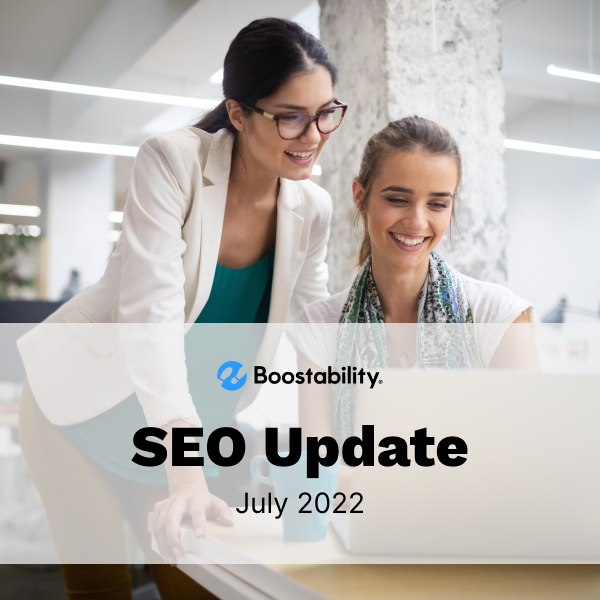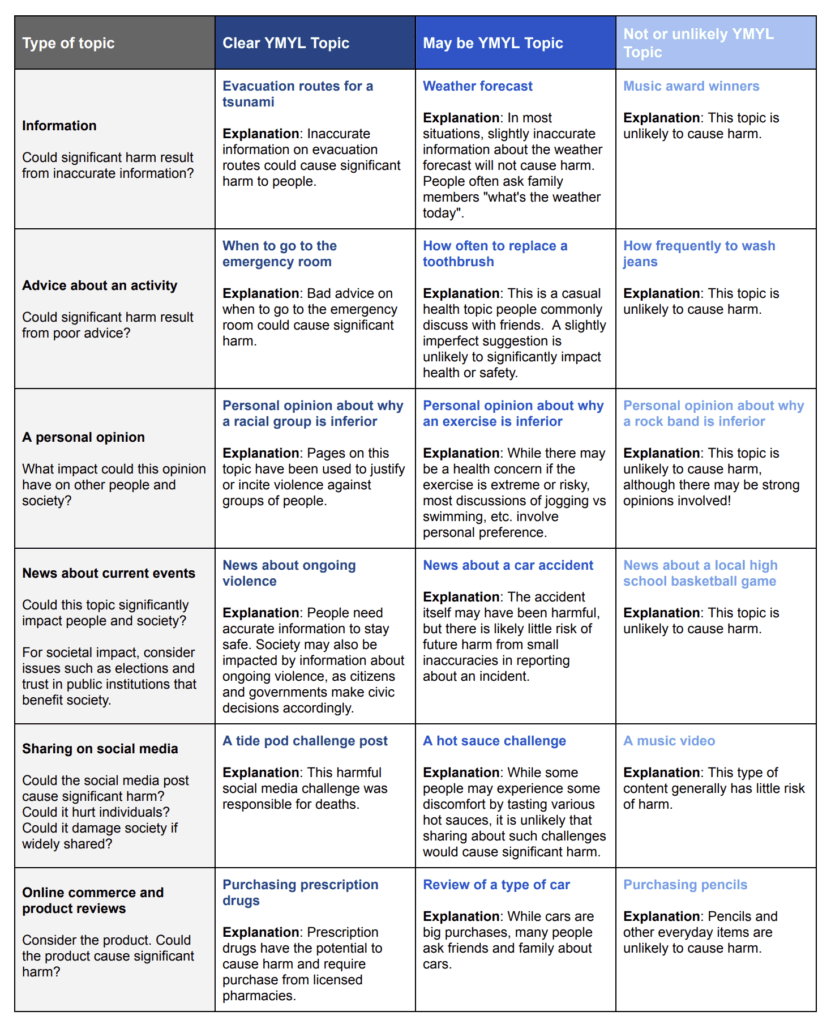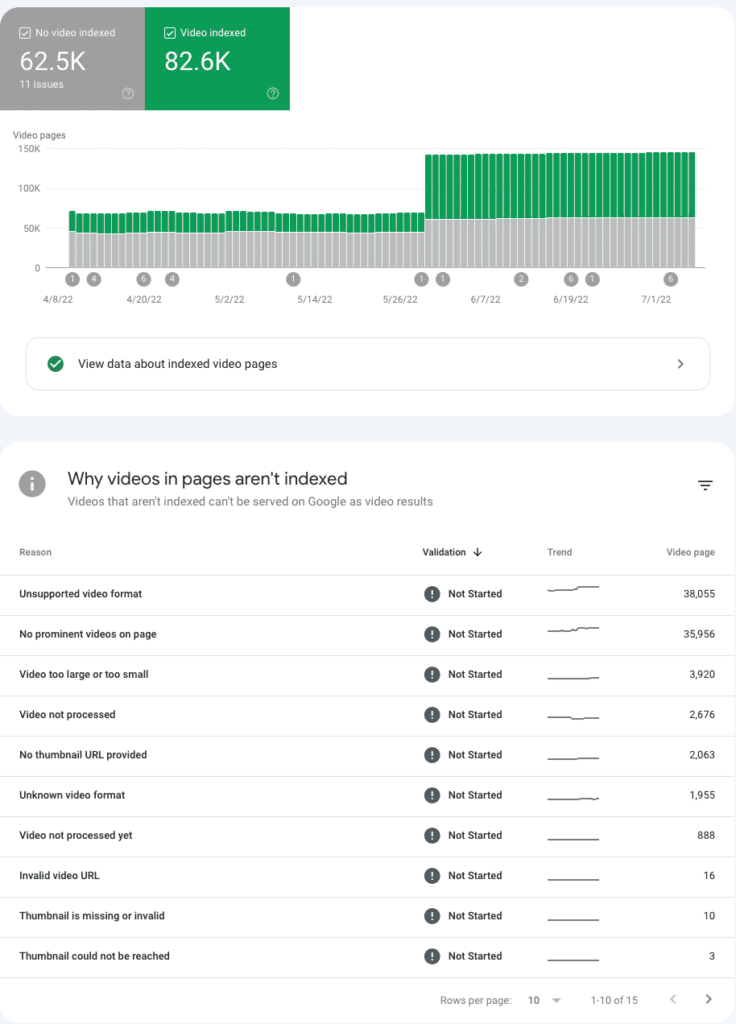
Another month, another several SEO Updates and speculation to talk through. The end of the month brought two big newsworthy items including a Google Product Reviews Update and the first update to the Quality Rater Guidelines that we’ve seen in 2022. No sense in beating around the bush, let’s dive in.
Product Reviews Update – July 27th
While not a core algorithm update, the Google Product Reviews Updates of the past few years have been fairly dramatic in SERP volatility. Like most updates, Google didn’t reveal exactly what is included in this, just a link about writing high quality product reviews. The goal being to help shoppers discover the product reviews left by other customers when they search on Google. And it all comes down to improving how the user will understand a product, or the user experience. This update didn’t seem to cause a ton of fluctuations in the SERPs according to Rank Ranger, but some review sites with fewer reviews on their services showed some dramatic dips.

Quality Rater Guidelines Update – July 28th
Google never reveals what is in its algorithm. But the Quality Rater Guidelines are the closest thing we have to what Google considers important things to have on your website in order to rank. The Quality Raters help the Google algorithm do its job better by providing a human look to millions of websites on the internet. The guidelines are what the Quality Raters use to evaluate the websites they visit.
So for this update to the Guidelines in July, we were able to take away a few big things that show what Google considers important in your website contact. The big changes focus on Your Money Your Life related websites (YMYL). Emphasizing the need to focus on topics with a high level of accuracy. Before this July 28th update, Google broke down YMYL topics to include the following:
- News & current events
- Civics, government, & law
- Finance
- Shopping
- Health and safety
- Groups of people.
Now, those topics are totally gone. Google now defines YMYL as topics that could present a “high risk of harm” and can “impact the health, financial stability, or safety of people, or the welfare or well-being of society.” Additionally, they ask quality raters to consider YMYL topics in terms of how the content could harm individuals or society in terms of health or safety, financial security, society, or “other”. In the guidelines, Google gave a table of delineation of what it considered YMYL topics.

They added additional clarifications to Expertise, Authoritativeness, and Trustworthiness (E-A-T) guidelines to look at the purpose of the page and how low page quality can affect the rest of the website. So what exactly does it mean to be a low quality page? They say it can happen on any website including academic sites, nonprofits, government websites, or any other site designed to provide information.
But in this context, “Low quality characteristics do not depend on the purpose or topic of the page. Shocking or exaggerated titles, or a mildly negative reputation for the website or the content creator is reason to assign a Low rating for any page.” This is reason to improve your E-A-T on any site. Especially for websites who’s purpose is to provide information. Content creators should have strong author bios that help to demonstrate their expertise. Again E-A-T is demonstrated on a per-page basis, not as an entire site.
Google also said that throughout the Quality Rater Guideline document it changed language to be applicable to all devices. And they updated screenshots and examples of concepts that are no longer relevant.
You can see an in-depth summary of the changes by The SEM Post.
Video Insights in Google Search Console
The trend of video content everywhere you go is not going away. You see TikTok, Reels, shorts, and product content all over. Social media sites are changing their algorithms around it. And Google is taking note. As more and more marketers add video to their websites, Google is helping you keep track of it and how it’s viewed by the search engine.
For the first time we’re seeing a video indexing report within Google Search Console. But it will become available over the next few months. Essentially it will tell you how many indexed pages on your site have video content. And it can help you understand your performance of your videos with Google. Plus and how to improve them to better show up in Search results.
From Search Engine Journal, here is a screenshot of what the report looks like.

It works a lot like most reports in Google Search Console. It will tell you how many videos Google successfully indexed. Plus some issues that could prevent the indexing of videos. Then it also includes the URL inspection tool to say when there were issues indexing the video. Essentially it will help you make better strategic decisions on how to help your videos show up in Google Search. As videos continue to grow in popularity, you can guarantee that Google will find new ways to show video content in the SERPs.
Google My Business App Gone for Good
We’ve known this one is coming for a while. But The Google My Business standalone app no longer lets you edit your Business profile or make any changes. The app still exists if you have it, but it serves no purpose. Instead, Google points you to manage your profile, view performance, connect with customers through the Google Maps or Google Search apps. .
Twitter Nofollow Attributes are Back
Another month, another several SEO Updates and speculation to talk through. The end of the month brought two big newsworthy items including a Google Product Reviews Update and the first update to the Quality Rater Guidelines that we’ve seen in 2022. No sense in beating around the bush, let’s dive in.
Product Reviews Update – July 27th
While not a core algorithm update, the Google Product Reviews Updates of the past few years have been fairly dramatic in SERP volatility. Like most updates, Google didn’t reveal exactly what is included in this, just a link about writing high quality product reviews. The goal being to help shoppers discover the product reviews left by other customers when they search on Google. And it all comes down to improving how the user will understand a product, or the user experience. This update didn’t seem to cause a ton of fluctuations in the SERPs according to Rank Ranger, but some review sites with fewer reviews on their services showed some dramatic dips.

Quality Rater Guidelines Update – July 28th
Google never reveals what is in its algorithm. But the Quality Rater Guidelines are the closest thing we have to what Google considers important things to have on your website in order to rank. The Quality Raters help the Google algorithm do its job better by providing a human look to millions of websites on the internet. The guidelines are what the Quality Raters use to evaluate the websites they visit.
So for this update to the Guidelines in July, we were able to take away a few big things that show what Google considers important in your website contact. The big changes focus on Your Money Your Life related websites (YMYL). Emphasizing the need to focus on topics with a high level of accuracy. Before this July 28th update, Google broke down YMYL topics to include the following:
- News & current events
- Civics, government, & law
- Finance
- Shopping
- Health and safety
- Groups of people.
Now, those topics are totally gone. Google now defines YMYL as topics that could present a “high risk of harm” and can “impact the health, financial stability, or safety of people, or the welfare or well-being of society.” Additionally, they ask quality raters to consider YMYL topics in terms of how the content could harm individuals or society in terms of health or safety, financial security, society, or “other”. In the guidelines, Google gave a table of delineation of what it considered YMYL topics.

They added additional clarifications to Expertise, Authoritativeness, and Trustworthiness (E-A-T) guidelines to look at the purpose of the page and how low page quality can affect the rest of the website. So what exactly does it mean to be a low quality page? They say it can happen on any website including academic sites, nonprofits, government websites, or any other site designed to provide information.
But in this context, “Low quality characteristics do not depend on the purpose or topic of the page. Shocking or exaggerated titles, or a mildly negative reputation for the website or the content creator is reason to assign a Low rating for any page.” This is reason to improve your E-A-T on any site. Especially for websites who’s purpose is to provide information. Content creators should have strong author bios that help to demonstrate their expertise. Again E-A-T is demonstrated on a per-page basis, not as an entire site.
Google also said that throughout the Quality Rater Guideline document it changed language to be applicable to all devices. And they updated screenshots and examples of concepts that are no longer relevant.
You can see an in-depth summary of the changes by The SEM Post.
Video Insights in Google Search Console
The trend of video content everywhere you go is not going away. You see TikTok, Reels, shorts, and product content all over. Social media sites are changing their algorithms around it. And Google is taking note. As more and more marketers add video to their websites, Google is helping you keep track of it and how it’s viewed by the search engine.
For the first time we’re seeing a video indexing report within Google Search Console. But it will become available over the next few months. Essentially it will tell you how many indexed pages on your site have video content. And it can help you understand your performance of your videos with Google. Plus and how to improve them to better show up in Search results.
From Search Engine Journal, here is a screenshot of what the report looks like.

It works a lot like most reports in Google Search Console. It will tell you how many videos Google successfully indexed. Plus some issues that could prevent the indexing of videos. Then it also includes the URL inspection tool to say when there were issues indexing the video. Essentially it will help you make better strategic decisions on how to help your videos show up in Google Search. As videos continue to grow in popularity, you can guarantee that Google will find new ways to show video content in the SERPs.
Google My Business App Gone for Good
We’ve known this one is coming for a while. But The Google My Business standalone app no longer lets you edit your Business profile or make any changes. The app still exists if you have it, but it serves no purpose. Instead, Google points you to manage your profile, view performance, connect with customers through the Google Maps or Google Search apps. .
Twitter Nofollow Attributes are Back
You might remember from last month’s update that Twitter made a very surprising move and removed the Nofollow attributes from their Tweets meaning tweeting links had some SEO value to them. But just as quickly as that happened, they took it away again at the start of the month.
Google never said if they would follow the links posted during that small window. But once again, Twitter and other social media should not be counted as new links for your website. .
